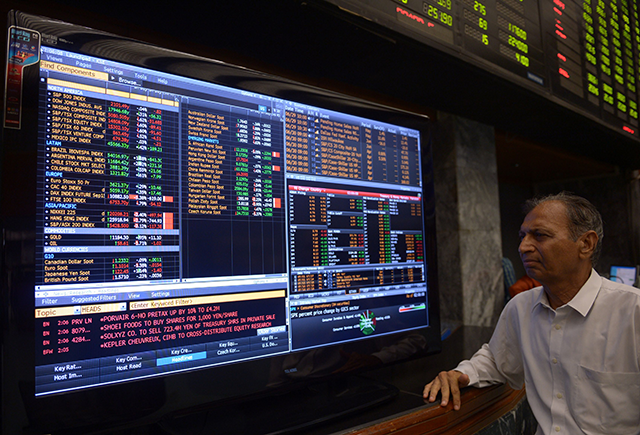KSE-100 Index Falls by 91.45 Points, Closing at 77,992.79
KSE-100 Index Declines by 91.45 Points, Settles at 77,992.79 Amid Loan Rollover Concerns
KARACHI:
The Pakistan Stock Exchange (PSX) experienced a modest decline on Wednesday, with the KSE-100 index falling by 91.45 points to close at 77,992.79. This drop came amidst escalating worries over Pakistan’s economic prospects and uncertainties surrounding the rollover of $9 billion in loans.
The trading day began with a positive outlook as the KSE-100 index hit an intra-day high of 78,334.60 points. However, this momentum could not be sustained due to mounting concerns over Pakistan’s financial stability. Reports suggesting that Pakistan’s inclusion in the International Monetary Fund (IMF) board meeting agenda for the Extended Fund Facility (EFF) might be delayed due to unresolved financing gaps and ongoing protests related to high taxes and soaring industrial power tariffs dampened market sentiment.
Despite receiving a mid-session boost from Moody’s upgrade of Pakistan’s local and foreign currency issuer and senior unsecured debt ratings to Caa2 with a positive outlook, the market struggled to maintain its gains. The index subsequently fell below the 78,000 mark, reaching its intra-day low of 77,990.34 points.
Ahsan Mehanti, Managing Director of Arif Habib Corp, attributed the market’s decline to weak economic outlooks and uncertainties surrounding the $9 billion loan rollovers. “Stocks closed lower on concerns over the economic outlook and reports suggesting delays in the IMF’s EFF agenda due to unresolved financing issues and rising protests over taxes and power tariffs,” Mehanti explained.
The mid-session support came in the form of Moody’s ratings upgrade, which improved investor sentiment temporarily. However, the overall market remained under pressure as the concerns regarding Pakistan’s economic stability persisted. “The positive news from Moody’s was overshadowed by concerns about the IMF loan program and ongoing financial challenges,” Mehanti added.
The KSE-100 index ended the day with a modest loss of 91.45 points, or 0.12%. The benchmark index closed at 77,992.79 points, reflecting a continuation of the downward trend observed from the previous trading day.
Topline Securities noted that the market opened on a negative note, continuing the trend from Tuesday. Key contributors to the index’s decline included Bank AL Habib, Highnoon Laboratories, Packages Limited, MCB Bank, and Hub Power, which together contributed a cumulative loss of 104 points. Conversely, stocks like Mari Petroleum, Engro Corporation, and Fauji Fertiliser experienced buying interest, adding 162 points to the index.

In its review, Arif Habib Limited (AHL) described the trading session as relatively flat, with the KSE-100 index closely tracking the 78,000 level. Among the major gainers were Mari Petroleum (+2.67%), Engro Corp (+1.73%), and Fauji Fertiliser (+1.03%). Meanwhile, significant drags included Bank AL Habib (-0.98%), Highnoon Laboratories (-3.56%), and Packages Limited (-4.79%).
JS Global analyst Mohammed Waqar Iqbal remarked that the Moody’s ratings upgrade failed to restore investor confidence. “The news of the ratings upgrade did not significantly boost market sentiment. We may see similar trends unless there is a positive development, particularly regarding the approval of the IMF loan program,” Iqbal noted.
Trading volumes saw an increase, with 636.02 million shares traded compared to 591.5 million on Tuesday. The total value of shares traded was Rs16.3 billion. Out of 452 companies traded, 140 stocks closed higher, 260 fell, and 52 remained unchanged.
Kohinoor Spinning Mills led the volume charts with 124.7 million shares traded, closing at Rs11.44 after a loss of Rs0.13. Fauji Foods followed with 39.3 million shares traded, closing at Rs8.92 after gaining Rs0.39. Yousuf Weaving Mills traded 34.9 million shares, ending at Rs5.81 after a loss of Rs0.27.
Foreign investors were net buyers of shares worth Rs131.7 million, according to the National Clearing Company of Pakistan Limited (NCCPL). Despite this, domestic market sentiment remained cautious amidst ongoing economic challenges.

